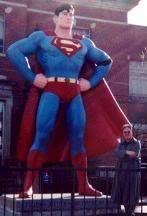| Pop Culture Gadabout | ||
|
Wednesday, December 28, 2005 ( 12/28/2005 02:01:00 PM ) Bill S.  "RATIONALITY ALWAYS GETS IN THE WAY OF COMMON SENSE!" – Catching up on my book reading over the past few months, I recently finished a novel that I'd purchased over a year-and-a-half ago in a Savannah, GA. Bookstore, Peter David's Knight Life (Ace Books). A revamped version of a novel originally published in 1987, the book was revised by the author fifteen years later and expanded by almost half again as much. As a perpetual re-writer, I can definitely identify with the practice. "RATIONALITY ALWAYS GETS IN THE WAY OF COMMON SENSE!" – Catching up on my book reading over the past few months, I recently finished a novel that I'd purchased over a year-and-a-half ago in a Savannah, GA. Bookstore, Peter David's Knight Life (Ace Books). A revamped version of a novel originally published in 1987, the book was revised by the author fifteen years later and expanded by almost half again as much. As a perpetual re-writer, I can definitely identify with the practice.David's reworked work is an amusing political fantasy about the return of Arthur Pendragon and the supporting cast of Camelot into twentieth century New York. With a rejuvenated Merlin (he looks like a young boy) as his political advisor, Arthur decides to run for mayor of the Big Apple as an Independent; abetting him in his political quest is a young woman named Gwen Devere, who appears to be the reincarnation of Lady Guinevere. Merlin is worried that Gwen, following tradition, will betray his liege once again, but we're less sure about that, particularly since her ex-boyfriend Lance is an abusive, self-absorbed lout. Arthur's enemy and sister Morgan LeFay is still around, of course. When we first see her, she's apartment bound, fat and depressed – but on learning that Arthur is back in the picture, the sorceress immediately shapes up. Son Modred is conveniently working as the political advisor to Republican mayoral candidate Bernard Keating, an un-telegenic district attorney who is running as a Law 'N' Order type. The only Round Tabler still extant is Sir Percival, the finder of the Grail, who's been given eternal life (and hates it) after supping from the holy chalice. It's David's conceit that Arthur's no-nonsense way of speaking to the voters gives him an edge over more traditionally minded Democratic and Republican political hacks: an idea as familiar as Frank Capra, though David has fun playing his straightforward monarch against more equivocal twenty-first century mores. While the book pre-dates today's politics of terror-mongering and free-range slandering, the author did revise it somewhat to reflect some forces that weren't in play in the late 80's (e.g., "the Republicans as a non-force in New York mayoral politics," as David notes in his foreword). Republican Keating is more fully described in the book than his Democratic compeer Kent Taylor (whose biggest moment in the book is his death at the hands of Morgan), but the primary sense we get of either opponent’s politics is through their reactions to the things Arthur says. And even the updated Life doesn't take into the account the kind of sleazy political machinations that have characterized more current election campaigns. (Surely Modred is corrupt enough to come up with a good Swift Boat-ish smear instead of the ineffectual ploy he concocts against Arthur during a mayoral debate.) Perhaps that's to David's credit: when today's reality threatens to out-grotesque political satire, how deep into the muck should a humorist be willing to wallow, anyway? I suspect things get darker in a more recently completed 2003 presidential election sequel (One Knight Only), however . . . If David's political swipes have been arguably outstripped by current events, his book remains an entertaining read for its witty twists on the Camelot story. Thus, when the Lady of the Lake appears in the middle of Central Park Lake brandishing Excalibur, David ably deflates the scene in Python-esque fashion by covering her in lake sludge. Looking to recruit new knights for his 21st Century Round Table, Arthur is forced to rely on a pair of burned-out druggies. His reincarnated Lancelot is a self-absorbed would-be writer who sponges off temp worker Gwen. When Morgan seduces Lance and later abducts the young boy Merlin, her Den of Evil turns out to be a run-down two-story located in Verona, New Jersey. Who needs caves or castles when you've got affordable housing? # | |
|
|

